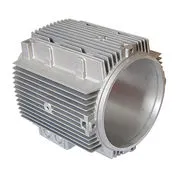Mobile:+86-311-808-126-83
Email:info@ydcastings.com
aluminium die casting factory
The Role of Aluminium Die Casting Factories in Modern Industry
Aluminium die casting is a sophisticated manufacturing process that has gained significant traction in various industries due to its versatility, efficiency, and cost-effectiveness. Factories specializing in aluminium die casting play a crucial role in supplying high-quality components for products ranging from automotive parts to consumer electronics. This article explores the importance of aluminium die casting factories, the process itself, and the benefits they offer to modern industry.
Understanding Aluminium Die Casting
Aluminium die casting involves the process of forcing molten aluminium into a mold cavity under high pressure. This method allows for the production of complex shapes with tight tolerances and excellent surface finishes. The process is particularly suited for high-volume production runs, making it a popular choice for manufacturers looking to produce consistent and durable parts efficiently.
One of the key advantages of aluminium as a material is its lightweight nature combined with high strength. This property makes it ideal for applications where weight reduction is essential, such as in the automotive and aerospace sectors. Additionally, aluminium has excellent corrosion resistance, ensuring that parts retain their integrity over time even in harsh environments.
The Aluminium Die Casting Process
The aluminium die casting process generally involves several stages
1. Melting Aluminium is melted in a furnace, reaching a temperature where it becomes liquid.
2. Injection The molten aluminium is injected into a pre-prepared steel die under high pressure. The quick injection time is critical for minimizing defects and ensuring even distribution within the mold.
3. Cooling Once the metal fills the mold, it begins to cool and solidify. This cooling phase is crucial, as it affects the mechanical properties and surface finish of the final product.
aluminium die casting factory

4. Ejection After the part has cooled sufficiently, the die opens, and the finished part is ejected.
5. Post-Processing In many cases, the cast part undergoes additional processes such as machining, surface treatment, and quality inspection to meet specific customer requirements.
The Benefits of Aluminium Die Casting Factories
1. Cost Efficiency Aluminium die casting offers a lower production cost per unit for high-volume products compared to other manufacturing methods, such as machining or plastic injection molding. The quick production cycles lead to faster turnaround times, benefiting industries that require swift delivery.
2. Precision and Quality Die casting produces highly accurate parts with excellent surface finishes, reducing the need for extensive post-processing. This precision is essential in applications like automotive components, where even minor discrepancies can lead to major failures.
3. Sustainability Many aluminium die casting factories are adopting more sustainable practices, such as recycling scrap aluminium and minimizing waste. Aluminium itself is highly recyclable, with recycled aluminium requiring up to 95% less energy to process than primary aluminium.
4. Design Flexibility The die casting process allows for intricate designs and complex geometries that may be challenging with other manufacturing techniques. This capability enables engineers and designers to innovate and create lightweight, functionally optimized parts.
5. Final Product Performance The mechanical properties of die-cast aluminium parts are generally superior to those produced using other methods. The resulting components are often stronger and more resistant to factors like fatigue, making them ideal for demanding applications.
Conclusion
Aluminium die casting factories are essential players in the manufacturing landscape, providing high-quality and durable components for a multitude of industries. The combination of cost-effectiveness, precision, and sustainability positions aluminium die casting as a preferred manufacturing method in today's competitive market. As industries continue to evolve and demand innovative solutions, aluminium die casting will likely remain at the forefront, pushing the boundaries of what is possible in component design and production.
-
Why Should You Invest in Superior Pump Castings for Your Equipment?NewsJun.09,2025
-
Unlock Performance Potential with Stainless Impellers and Aluminum End CapsNewsJun.09,2025
-
Revolutionize Your Machinery with Superior Cast Iron and Aluminum ComponentsNewsJun.09,2025
-
Revolutionize Fluid Dynamics with Premium Pump ComponentsNewsJun.09,2025
-
Optimizing Industrial Systems with Essential Valve ComponentsNewsJun.09,2025
-
Elevate Grid Efficiency with High-Precision Power CastingsNewsJun.09,2025











